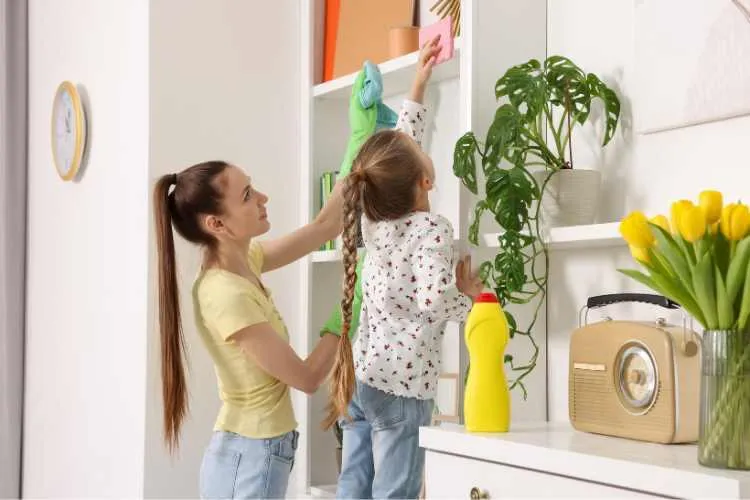

OUTDOOR RECREATION ARTICLES

Clean and Green: DIY Recipes for Your Spring Cleaning
By Diane Del Toro, Family Features, and e.living.com
In the annual whirlwind of spring cleaning, Amanda found herself face-to-face with a neglected kitchen cabinet. Armed with a homemade cleaning solution, she embarked on a mission to restore the cabinet's lost shine. With each wipe, the dirt surrendered, revealing a sparkling surface underneath. The satisfaction she derived from transforming a seemingly hopeless mess into a spotless haven was unexpectedly gratifying. It wasn't just about cleanliness; it was a tangible victory over disorder, a reminder that within the mundane task of cleaning, there was a simple yet rewarding triumph over chaos.
Spring cleaning, a cherished annual tradition, intertwines practicality with symbolic renewal. It involves a thorough overhaul of living spaces, a ritual marked by deep cleaning, decluttering, and reorganization as winter yields to the warmth of spring. Rooted in various cultures, the tradition signifies the shedding of winter stagnation and the embrace of a fresh beginning.
What makes this ritual even more compelling is the growing trend towards using homemade cleaning products. People are increasingly turning to natural alternatives, harnessing the cleansing power of everyday ingredients not only for their effectiveness but also for health, sustainability, and cost-effectiveness. Spring cleaning, therefore, becomes a holistic celebration of both physical and metaphorical rejuvenation, a conscious choice to embrace a greener, healthier, and more economical approach to household hygiene.
Choosing homemade cleaning products is a simple yet powerful decision that resonates with a healthy lifestyle. Unlike commercial cleaners laden with harsh chemicals, DIY alternatives harness the cleansing power of everyday ingredients like vinegar, baking soda, and essential oils. These natural components not only effectively eliminate dirt and grime but also minimize exposure to harmful toxins, promoting a healthier indoor environment. Homemade cleaners are eco-friendly, reducing plastic waste and environmental impact. Additionally, crafting your cleaning solutions proves economical, sparing your wallet while fostering a sense of self-sufficiency. Embrace the wholesome goodness of homemade cleaners for a greener, safer, and more budget-conscious approach to household hygiene.
The following are some easy-to-prepare household cleaners that will help you tackle your spring cleaning.

Homemade All-Purpose Cleaner
1 empty spray bottle (1 quart)
2 cups distilled water
1/4 cup vinegar
12-20 drops tea tree essential oil
1 teaspoon castile or phosphorous-free dish soap or washing soda
Fill the cleaning spray bottle with distilled water. Add vinegar, tea tree essential oil, and soap or washing soda. Shake well.
This version of a homemade cleaner is environmentally friendly and less likely to cause irritation. You can also control the strength of the cleaner by rationing the ingredients. Adding essential oils provides natural fragrance and helps deodorize. For example, the tea tree oil in this homemade all-purpose cleaner has antibacterial, antiviral, antifungal, and antiseptic qualities, making it a versatile and safe solution for cleaning around the house.

Homemade Glass Cleaner
1 empty spray bottle (1 quart)
1 cup water
3 tablespoons white vinegar
1/4 cup isopropyl alcohol
Add water, vinegar, and alcohol to the quarter bottle. Replace the lid and shake until ingredients are thoroughly combined. Use this mixture with a microfiber cloth to clean glass surfaces like windows, mirrors, or sliding glass doors.
The rubbing alcohol to this recipe helps the solution evaporate quickly on glass surfaces, reducing the chance of leaving water spots behind. Rubbing alcohol is a disinfectant, so this cleaner can be used to disinfect surfaces and kill germs and other bacteria. Note: isopropyl alcohol is highly flammable, so be sure to store this homemade window cleaner in a cool, safe spot away from children and pets. If you use this to clean, proceed with caution and be sure to read the safety label on the bottle.

Homemade Multipurpose Cleaning Scrub for Tough Messes
2-6 tablespoons lemon juice
1 cup borax powder
Combine the two tablespoons of lemon juice with the borax powder, adding more lemon juice until you create a thick paste. Use it to scrub tough messes as well as rust stains on sinks.
Do not use this cleaner on granite or marble countertops; acidity from the lemon juice can be damaging to porous surfaces.

Homemade Ceramic Tile Floor Cleaner
2 gallons of hot water
1/4 cup distilled white vinegar
1 tablespoon dishwashing liquid
Mix ingredients in a large sink or bucket. Vacuum, sweep, or dust mop floors to remove loose soil and hair. Fill a second bucket or sink with clean water. Dip your mop in the cleaning solution and wring until it is not sopping wet. Mop the floor. Rinse the mop in the clean water as it becomes soiled before dipping it back in the cleaning solution.
This DIY floor cleaner is appropriate for ceramic and tile floors. Follow the proportions carefully so you won't have too many suds and you won't have to rinse the floor after mopping.
